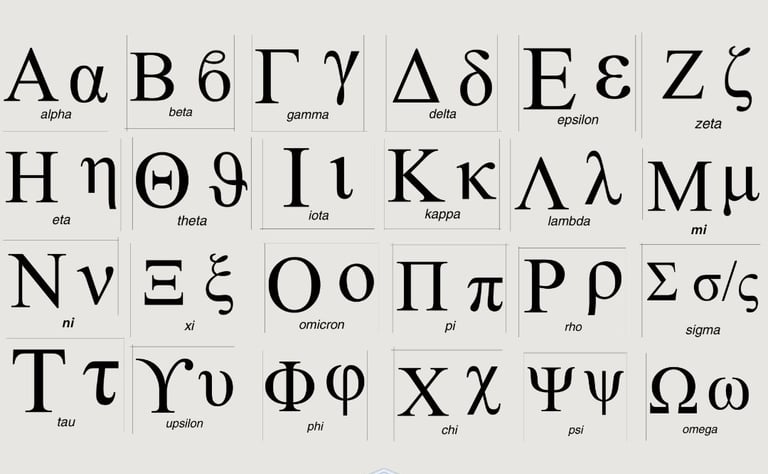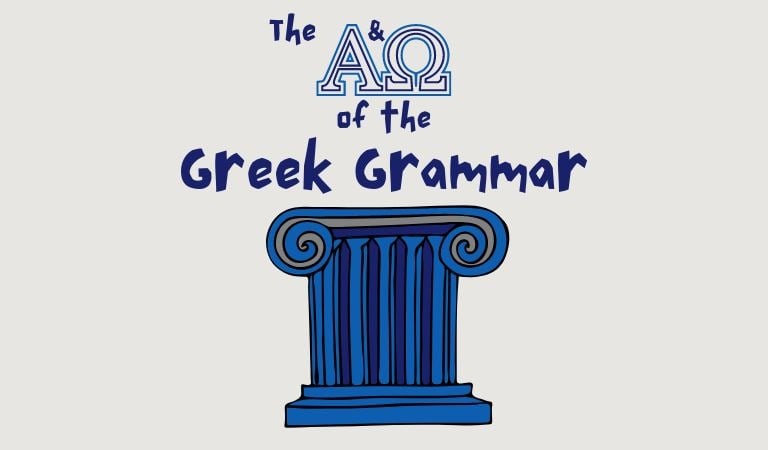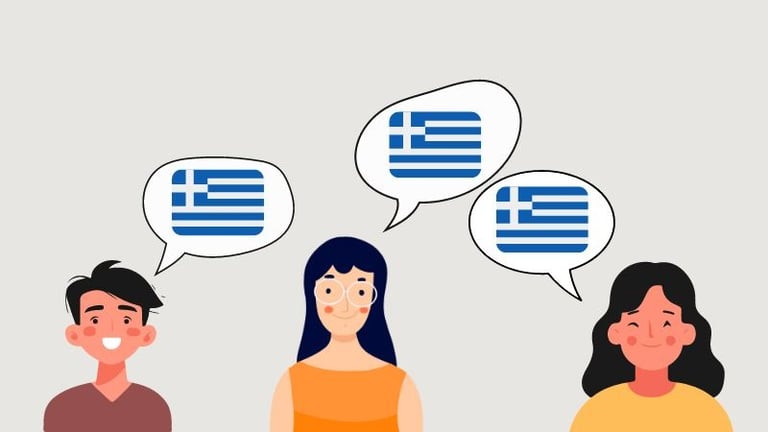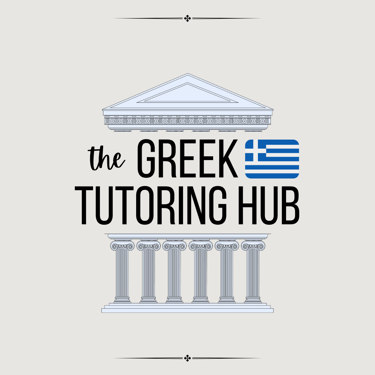Most common mistakes in learning Greek
Some of the most common mistakes that learners make, which in turn, make Greek difficult to learn.
LEARN GREEK ONLINE
7/24/20247 min read
Learning Greek is an exciting journey that opens doors to a rich culture and history. However, many beginners face challenges that can slow down their progress. Identifying and avoiding these common mistakes can make your learning experience smoother and more enjoyable. In this post, we’ll explore the most frequent errors and provide tips for beginner Greek learners to help you learn Greek effectively and speak Greek confidently.
Common Mistakes Beginners Make When Learning Greek and How to Avoid Them
Greek is admittedly one of the most challenging languages when it comes to correctly pronouncing its various special characters like 'γ' / ga-ma / which sounds close to the English 'y' sound, rather than the 'g' sound which is quite often mistaken for. Or the Greek letter 'ξ' which to a native English speaker, for example, would technically be a double letter sound - phonetically represented as a 'ks' sound. And of course, one should also take into consideration the various phonetic and pronunciation nuances of the Greek diphthongs (letter combinations), such as the various double vowels ει, ευ, ου to name a few, or some of the double consonants like ''γγ'', ''γχ'', ''τσ'' and more.
With all the above factors in mind, it is quite natural to understand why one of the biggest hurdles in learning Greek is mastering pronunciation. Unlike English, the Greek language has distinct sounds that can be fairly tricky for beginners. Ignoring pronunciation can lead to misunderstandings and frustration, due to the fact that a lot of Greek words can mean totally different things even when the stress point is altered.
Mistake 1: Ignoring Pronunciation
Tip: Focus on pronunciation from the start. Listen to native speakers, use language learning apps that emphasise speaking, and practice regularly. Pay special attention to sounds that don’t exist in your native language, and of course never hesitate to ask your Greek tutor for help.. (in fact, this would actually be the best starting point!).


Mistake 2: Relying Too Much on Transliteration
Transliteration can be a helpful tool at the beginning, but relying on it too much can hinder your progress.
When it comes to transliteration, what happens is that the script of a word is changed from one language to another which is meant to help the learners understand how a word sounds. Therefore, with that in mind, and since Greek is a phonetic language, spending the required time learning the alphabet is quite a crucial aspect of proper pronunciation and comprehension.


Tip: Try to dedicate enough time to learning the Greek alphabet early on. Practice reading and writing in Greek to become more comfortable with the script, and the various unique Greek characters of the Greek Alphabet. This way, you will have a greater chance to improve your reading skills and it will help you learn Greek more efficiently.
Mistake 3: Skipping Grammar Basics
Grammar might not be the most exciting part of language learning, but it’s essential. With Greek being a relatively complicated and demanding language when it comes to its Grammar rules, and exceptions, skipping even the basics can lead to confusion and make it difficult to form correct sentences. Dedicating enough time to comprehend Greek grammar rules regarding regular and irregular verb conjugation, and agreement between personal pronouns, adjectives, and nouns would be a good start. Apart from the time and effort you are willing to dedicate to studying Greek grammar, achieving all of the above of course, is also dependent on the level and quality of guidance you will receive from your Greek language tutor.


Tip: Spend time understanding the fundamental grammar rules of the Greek language. Learn about verb conjugations, noun cases, sentence structure, and specific exceptions. A good idea is to utilise additional resources like grammar books, relevant content you might come across online (just make sure it is provided by reliable sources, and of course, your Greek tutor to solidify your knowledge and identify any learning gaps and opportunities for personal improvements.
Mistake 4: Not Practicing Speaking Enough
Many learners focus heavily on reading and writing, neglecting speaking practice. This can lead to a lack of confidence when trying to converse in Greek. Nowadays, you are very likely to come across a lot of free useful, and reliable content that is provided by certified instructors. It is a form of fun and cost-free learning resources you can take advantage of, in order to improve your overall learning experience and definitely keep you motivated to enhance your understanding of Greek.


Tip: Incorporate speaking practice into your daily routine. Practice with native speakers, join language exchange groups or use apps that offer speaking exercises. The more you practice speaking, the more confident you will become. We have invested a lot of time in creating a very active social media representation of our Language School, so it would be a very good idea to follow us on our various social media platforms to start gathering multiple supporting learning materials for free!
You can follow us on Instagram, Facebook, Pinterest, and X, where you can engage with our community of fellow Greek learners, exchange opinions, and directly ask for advice and evaluation of anything that you feel is hindering your Greek learning journey. Gaining feedback from native Greek tutors is for sure, a crucial and very effective tool!
Mistake 5: Overwhelming Yourself with Vocabulary
While building and enhancing your Greek language vocabulary is important, even if you have just started and you are currently a Level A1 or Level A2 student, trying to learn too many words at once can be overwhelming and counterproductive.
One of the most important aspects of making effective progress in your Greek learning journey is the option of a personalised and adaptable curriculum so that you will not only be relying on a 'one-size-fits-all' approach. Many students have different learning needs, different weaknesses, and of course, different strengths when it comes to understanding a foreign language.
Thus, a more tailored learning experience is probably the best way to go about it. It is for that reason, that we always recommend an initial consultation and a trial lesson which will both act as strong identifiers of your own personal learning requirements and goals!


Tip: If you are just starting out learning Greek, prioritise, and shift your focus on learning high-frequency words and phrases that you are likely to use in everyday conversations. Use flashcards, and spaced repetition systems, and try to use new words in context. Gradually expand your vocabulary as you become more comfortable with the basics.
Naturally, the amount and type of vocabulary that you will add to your arsenal, is affected by various factors such as your Learning Level, your overall progress, and perhaps some specific requirements - for instance, if you are studying Greek as part of a professional development path, which might require targeted terminology and vocabulary.
Mistake 6: Lack of Consistency
As is the case with any new skill or procedure you try to master, inconsistency when learning a new language is one of the biggest barriers to progress. Irregular study habits can lead to forgetting what you have learned and make it harder to advance, not necessarily for harder-to-understand languages such as Greek, but even for less demanding ones. It is, therefore, crucial to always try and remain focused, organised, and determined to keep a systematic approach to your language studying pattern.
That of course starts with your inner motivation which will help you to keep yourself inspired. Although a reliable tutor is fundamental to your overall progress if you do not have the initial self-discipline in place realising essential advancement will likely take longer.


Tip: Establish a regular study schedule and stick to it. Even short, daily practice sessions are more effective than long, sporadic ones. Set realistic goals and track your progress to stay motivated. This is where selecting an experienced and dedicated instructor is of great importance. You should be able to reach out to them, if need be, to express your concerns or notify them of a potential inability to successfully maintain an effective study routine. Utilising their professional expertise, they should be able to identify obstacles and make some useful suggestions regarding personalised studying tips and methods.
Synopsis - (we bet you already though this is a Greek word, right? )
Avoiding these common mistakes will set you on the path to mastering Greek more effectively. By focusing on pronunciation, learning the Greek alphabet, understanding grammar basics, practicing speaking, building vocabulary gradually at a suitable pace, and maintaining consistency, you are much more likely to find yourself making steady and essential progress.
Remember, learning any new language is a journey that requires patience and perseverance. Keep internally motivated, keep practicing, and you will soon speak Greek confidently.
For additional resources, and a more analytical view of the Greek language difficulty, check out our related post !
If you liked this article and found some value in it, feel free to share it with your friends or fellow Greek language learners!
Lastly, you can use this form to subscribe to our newsletter and download our FREE ''Essential Words & Phrases Cheat Sheet'' today!
Happy learning!
#greeklanguagelearning
#greeklanguageclasses
#greeklanguage lessons
Find us on social media
© 2024. All rights reserved.
Quick Navigation
Information
Join our newsletter and download your free copy of our 'essential greek phrases cheat sheet' !
enquiries: +44 7858 148305
